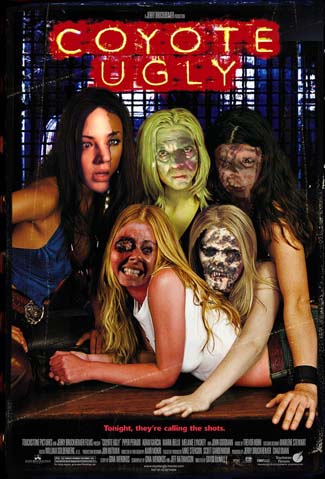
"HOLLYWOOD GARBAGE AND HOW TO SMELL IT"
by DENNIS NYBACK
The continuing waste of Newspaper space in the Arts and Entertainment pages on Hollywood movies mystifies and appalls me. Please be advised that I use the term Hollywood very loosely and intend it to cover 90% of current films. For roughly twenty years, the films being churned out have had nothing to do with art and everything to do with money. If these films should be reported on at all it should be in the financial section. The Arts & Entertainment pages should report on just that: films that qualify.
How is that we've arrived at this
desperate place? In the late Seventies,
the big motion picture producers hit
on a formula for money-making movies
and have stuck to it.  The
big secret of the formula is the concept
of structured mediocrity. Don't strive
for greatness, play it safe. Don't
challenge the audience, feed them
pabulum. Filmmaker John Woo recently
said "Movies today lack heart
and tears. Studios don't want to take
the risk".
The
big secret of the formula is the concept
of structured mediocrity. Don't strive
for greatness, play it safe. Don't
challenge the audience, feed them
pabulum. Filmmaker John Woo recently
said "Movies today lack heart
and tears. Studios don't want to take
the risk".
In contrast, Robert Browning once said "A man's reach should exceed his grasp". That statement is the antithesis of Hollywood today. They realize that art is not created by playing it safe but instead of reaching further, they grasp the easily attainable. Over and over and over. The critics have apparently failed to notice this and continue to take part in this colossal fraud by writing about the same old shit.
The steady growth of the pure Garbage spewed out every year results in a massive waste of newspaper ink and pulp. The modern market of exponenentially increasing multiplexes, short theatrical runs, unlimited TV channels, and video outlets, effectively monopolizes the limited available newspaper space. As a result, films made by people whose vision goes beyond profit are lost in the flood of celluloid sewage with its mega ad camapigns. This tacit conspiracy between film producers and newspapers almost guarantees that films made for profit will succeed and films made for art will fail.
The first part of the formula for box-office success that I mentioned earlier is an overriding philosophy. The most important thing is to strive for mediocrity. The mediocre film doesn't need to generate huge box office in the theatres. It may take a while but product placement alone offsets much of the cost. After the US theatrical run comes the Overseas markets, TV, and Video. The only way to screw this up is to try and make a better film. A film that challenges an audience, that is thought-provoking and something more than chewing gum for the eyes is the only one that can fail.
The second part of the standard formula emphasizes style over substance and includes the followng dictates:
- Start with a concept, not a script,
writing is not important.
- Never depend on the vision of
one writer but get a committee so
that one writer can spot the mistakes
the others are making.
- Get a star, acting is not important.
- Get a bombastic composer. The
composer is more important than
the writer. Good writing is rare
and difficult. So, why bother doing
that when you can stir the emotions
with loud music. (In certain films
aimed at the baby-boom generation,
a composer is not even neded; a
disc-jockey is. Select the right
blend of golden oldies a la Quentin
Tarentino and you're home free!)
- Get some special effects, again
volume not content is important.
- Most importantly, tack on a happy ending. Voila! It goes down easy and has no side effects such as being remembered a week later when the same thing is dressed up and trotted out again.
 I say that
this has now been going on for twenty years based on a conversation reported
in the New York Times several years ago. The reporter followed a maverick
Hollywood producer around for awhile and wrote about him. At one point
he is having lunch with a mainstream producers and says to him "Remember
how great some of those films were back in the Seventies when they would
actually have unhappy endings? Films like MEAN STREETS and THE PARALLAX
VIEW and MCCABE AND MRS. MILLER?" The mainstream guy just looked
at him like he was an idiot and said "Oh, that. That all ended with
ROCKY!".
I say that
this has now been going on for twenty years based on a conversation reported
in the New York Times several years ago. The reporter followed a maverick
Hollywood producer around for awhile and wrote about him. At one point
he is having lunch with a mainstream producers and says to him "Remember
how great some of those films were back in the Seventies when they would
actually have unhappy endings? Films like MEAN STREETS and THE PARALLAX
VIEW and MCCABE AND MRS. MILLER?" The mainstream guy just looked
at him like he was an idiot and said "Oh, that. That all ended with
ROCKY!".
The producers have realized this but the critics still haven't caught on. Many critics are now simply "Quote Whores". They will try to include one catchy line in every review they write in the hope that it will be used and credited to them in the advertisements. As long as they get their name in the ads, their career is a success. No matter how lousy a film is, it can always find a half dozen critics who will say it's great in some quotable way. In today's New York Times, Siskel and Ebert give "two thumbs up" to seven crummy movies. They also trot out the tried and true "A great date film" for an eighth. Paul Wunder is quoted as saying THE LOST WORLD is "The entertainment event of the decade". Maria Sales says CONAIR is "The Roller-coaster ride of your life". Joel Siegal says SPEED 2 is "A great summer film". Janet Maslin says BREAKDOWN "Packs a punch". It goes on and on. Silly overstatement, mindless hyperbole, trite cliches and out and out lies.
To help people to just say no to Hollywood Garbage, I offer the following ten suggestions:
- Never go to a film because it
is "The Number One Film In
America"
- Never go to a film that used more
than two script writers or is based
on a best selling novel.
- Never go to a film that advertises
its soundtrack on sale. Especially
if it lists several artists as being
featured on the soundtrack.
- Never go to a film because you
saw it advertised on Television
or because the trailer had a hilarious
line. Trailers were once used to
hint at what you would see. They
didn't want to give anything away
free but make you shell out money
to watch. Today they use the best
scenes and funniest lines to sucker
you into believing that there's
plenty more where that came from.
- Never go to a film that features
product tie-ins with any multi-national
burger chain.
- Never go to a film that runs an
advertisemet with guns pointing
at your or that has a number after
its title.
- Never go to a film if it's based
on a true story and you're expecting
the truth.
- Never go to a film based on a
TV show that baby-boomers remember.
- Never go to a film that is so
bad that even Siskel and Ebert don't
like it and the producers have to
resort to some quote whore you've
never heard of from an equally obscure
publication.
- Never go to a film with Quentin Tarentino, Oliver Stone, or anyone else that you care to add to this list.
That's enough for now. See you at the Movies!